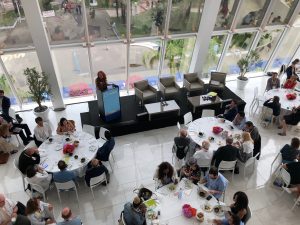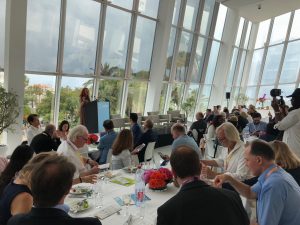
September 11, 2018, Lindsay, ON: The Three Rs Music Program is putting out a call to all Lindsay, Ontario residents for donations of gently used musical instruments. After a successful small-scale pilot at Sawdust City Music Festival in Gravenhurst, the first community instrument drive of the program will happen in partnership with the Trillium Lakelands District School Board (TLDSB) on September 29th.
Residents can drop off instruments between 12:30pm – 3:30pm at Mackey Celebrations Inc (35 Lindsay Street North, Lindsay, ON). While all instruments are welcomed, young musicians in the community have requested ukuleles, flutes, clarinets and trumpets to complete their music education program. The Three Rs Music Program has partnered with Van Halteren’s Music Centre, who will aid in refurbishing donated instruments. Once refurbished, instruments will be distributed back to the region’s schools based on the needs identified by the TLDSB. Music Canada Cares is proud to partner with MusiCounts to offer tax receipts for each instrument donation.
“In TLDSB, we know that music fosters the growth of a healthy mind, body, spirit and emotion. Music is not just a subject, but a way of being,” says Beth Wilson, Music Consultant at the Trillium Lakelands District School Board. “We are thrilled to be partnering with the Three R’s Music Program for this inaugural drive. With this initiative, our programs will continue to grow and give more students the opportunity to learn an instrument.”
“We’re encouraging all Lindsay residents to search your closets, basements and garages for any spare instruments,” says Sarah Hashem, Managing Director of The Three Rs Music Program. “We’re very excited to be bringing our inaugural instrument drive to Lindsay. Let’s seize this opportunity to strengthen music education in the community and to make a difference in the lives of local students.”
The Three Rs refers to rescuing instruments, restoring them to a fully functional condition and reuniting them with students. In addition to community donation appeals across Ontario, the program will repair instruments already in the possession of schools through repair grants and will connect students’ learning experiences to Ontario’s vibrant music industry through Artist Ambassadors, workshops and other events.
The Three Rs Music Program is made possible by an investment from the Government of Ontario and will improve equitable access to quality music education by increasing the inventory of musical instruments in Ontario’s publicly funded schools. The program prioritizes providing instrument to underserved communities, particularly at-risk, Indigenous and other underrepresented communities.
To stay updated with the latest news from The Three Rs Music Program, including information on future community appeals and how schools can apply for instruments, please follow Music Canada Cares on Facebook.
-30-
For more information:
Corey Poole, Music Canada
cpoole@musiccanada.com
+1 (647) 808-7359
About Music Canada Cares
Music Canada Cares is an affiliate of Music Canada that is dedicated to promoting and enhancing the societal benefits and value of music and those who create it.
About The 3 Rs Music Program
The Three Rs Music Program—rescuing instruments, restoring them to a fully functional condition and reuniting them with students—is advancing the effectiveness of publicly funded music education programs across Ontario through musical instrument refurbishment, community appeals, and artist connections. Using a community-driven approach, we will be ensuring more students have access to the developmental, cognitive, and social benefits of music. Music Canada Cares is proud to partner with the Government of Ontario for this program.
About Music Canada
Music Canada is a non-profit trade organization that represents the major record companies in Canada: Sony Music Entertainment Canada, Universal Music Canada and Warner Music Canada. Music Canada also works with some of the leading independent record labels and distributors, recording studios, live music venues, concert promoters, managers and artists in the promotion and development of the music cluster. For more on Music Canada, please visit www.musiccanada.com
*******
Tenue de la première cueillette d’instruments du Programme musical des trois R à Lindsay (Ontario)
Le 11 septembre 2018, Lindsay (Ontario) : Le Programme musical des trois R lance un appel à tous les résidents de Linsday (Ontario) pour les inviter à participer à une cueillette d’instruments de musique usagés. Précédée d’un petit projet pilote fort réussi au Sawdust City Music Festival de Gravenhurst, cette toute première cueillette communautaire d’instruments de musique sera organisée en partenariat avec le conseil scolaire Trillium Lakelands (TLDSB) le 29 septembre prochain.
Les résidents de Lindsay peuvent déposer des instruments de musique entre 12 h 20 et 15 h 30 au centre Mackey Celebrations Inc. (35, rue Lindsay nord, Lindsay, Ontario). Tous les instruments sont bienvenus, mais les jeunes musiciens de la communauté ont besoin d’ukulélés, de flûtes, de clarinettes et de trompettes pour leur programme d’éducation musicale. Le Programme musical des trois R s’est associé au Van Halteren’s Music Centre, qui contribuera à la remise en état des instruments donnés. Une fois réparés, les instruments seront redistribués dans les écoles de la région en fonction des besoins identifiés par le TLDSB. Music Canada vous aime est fier de s’associer à MusiCompte pour offrir à chaque donateur ou donatrice d’instrument un reçu aux fins de l’impôt.
« Au TLDSB, nous savons que la musique favorise une saine croissance mentale, physique, spirituelle et émotive. La musique n’est pas uniquement une matière scolaire, mais une véritable façon d’être », affirme Beth Wilson, conseillère musicale du conseil scolaire Trillium Lakelands. « Nous sommes extrêmement heureux de nous associer à la première cueillette d’instruments du Programme musical des trois R. Cette initiative aidera nos programmes à continuer de croître et à donner à un plus grand nombre d’élèves la chance d’apprendre à jouer d’un instrument. »
« Nous encourageons tous les citoyens de Lindsay à faire le tour de leurs placards, de leur sous-sol et de leur garage afin de voir s’ils ont des instruments de musique dont ils pourraient se départir », explique Sarah Hashem, directrice générale du Programme musical des trois R. « Nous sommes extrêmement heureux de présenter notre toute première cueillette d’instruments à Lindsay. Profitons-en pour consolider l’éducation musicale dans la communauté et faire une différence dans la vie des élèves. »
Le programme musical des trois R permet de récupérer les instruments, de les restaurer pour les remettre en bon état de fonctionnement et de les réaffecter à des élèves. En plus d’organiser des cueillettes d’instruments dans toutes les régions de l’Ontario, le programme assurera la réparation des instruments actuels des écoles ontariennes grâce à des subventions et bâtira des ponts entre l’expérience d’apprentissage des élèves ontariens et l’industrie musicale dynamique de la province grâce à la nomination d’artistes ambassadeurs et à l’organisation d’ateliers et d’autres événements.
Rendu possible par un investissement du gouvernement de l’Ontario, le Programme musical des trois R rendra plus équitable l’accès à une éducation musicale de qualité en enrichissant l’inventaire d’instruments de musique des écoles ontariennes financées par des fonds publics. Le programme met l’accent sur la remise d’instruments aux communautés sous-desservies, aux groupes particulièrement à risque, aux populations autochtones et aux autres groupes sous-représentés.
Pour en savoir plus sur le Programme musical des trois R, sur les prochaines cueillettes d’instruments de musique et sur la façon dont votre école peut présenter une demande de don d’instruments, suivez Music Canada vous aime sur Facebook.
-30-
Pour de plus amples renseignements :
Corey Poole, Music Canada
cpoole@musiccanada.com
+1 (647) 808-7359
À propos de Music Canada vous aime
Music Canada vous aime est une filiale de Music Canada vouée à la promotion et à l’enrichissement des bienfaits de la musique pour la société et de la valeur qu’elle représente pour ceux et celles qui la créent.
À propos du Programme musical des trois R
Le Programme musical des trois R – récupérer les instruments, les restaurer pour les remettre en bon état de fonctionnement et les réaffecter à des étudiants et des étudiantes – ajoute à l’efficacité des programmes d’éducation des écoles financées par des fonds publics de l’Ontario grâce à la remise en état d’instruments de musique, au lancement d’appels de fonds dans la collectivité et à la complicité des artistes. Dans une démarche centrée sur la collectivité, nous verrons à ce qu’un plus grand nombre d’étudiants et d’étudiantes aient accès aux bienfaits développementaux, cognitifs et sociaux de la musique. Music Canada est fière de s’associer au gouvernement de l’Ontario dans le cadre de ce programme.
À propos de Music Canada
Music Canada est une association professionnelle à but non lucratif qui représente les grandes maisons de disques au Canada, notamment Sony Music Entertainment Canada, Universal Music Canada et Warner Music Canada. Music Canada collabore également avec de nombreux chefs de file de l’industrie musicale indépendante – étiquettes et distributeurs de disques, studios d’enregistrement, lieux de spectacles, promoteurs de concerts, gérants et artistes – pour assurer la promotion et le développement du secteur de la musique. Pour en savoir plus sur Music Canada, veuillez vous rendre sur www.musiccanada.com












Music Canada